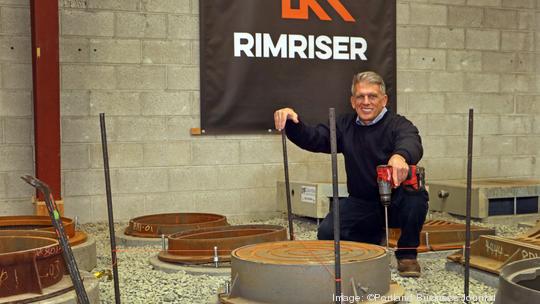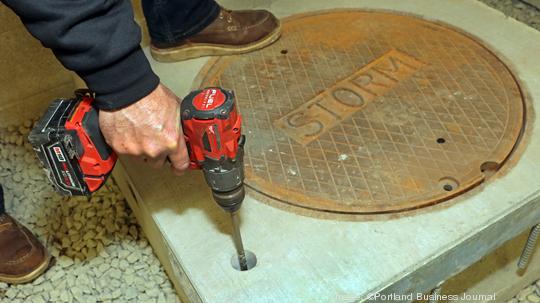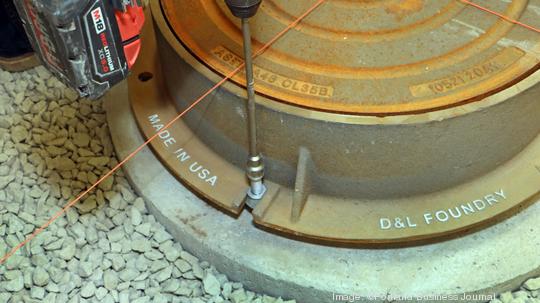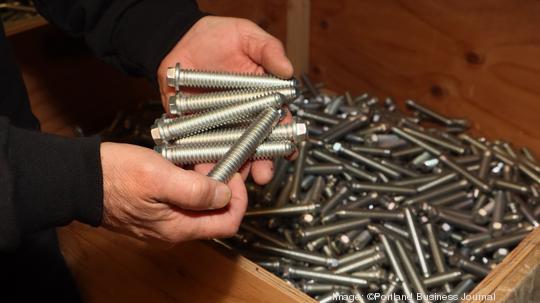
It can take years of research, tinkering, prototypes and pilot projects to transform innovation into a product that’s ready for the market (and get the market ready for the product).
A recent local case in point: The $2-billion-plus company ESS Inc., whose founders toiled for a decade to nail down an iron-flow battery for grid-scale energy storage and build a case for its need.
Then there’s Aaron Barr’s technological breakthrough.

Literally overnight, Barr devised a way for leveling manhole covers, catch basins, utility vaults and other embedded infrastructure with the pavement around them. With little in the way of changes to the original concept, his company, RimRiser, nine employees strong and growing, is now selling the system across the country.
“The thing that we hear the most is, ‘Why didn’t somebody think of this 100 years ago?’” Barr said.
Barr, as a general contractor and residential developer, had himself for years seen the need for RimRiser.
There was the equestrian passage tunnel under Southwest Wilsonville Road that needed its two storm drains aligned with grade days before a big show. They had to be cut off, a major job. Then there were the manholes on Marine Drive, during a road improvement project, that the city of Portland went back and forth on asking to be raised and lowered, driving Barr nuts.
Finally, a few years ago, there was a road in a subdivision development in Camas with dozens of catch basins that weren’t set right. That forced the curb installers to bypass those sections with their machine, leaving gaps to be completed by hand, both time-consuming and costly.
Barr had seen enough.

“I went over to the yard, I grabbed a concrete catch basin, threw it in the back of my truck, took it to my shop, retrofitted it that night and then brought it back to the job site,” he recalled.
The solution — a slot in each corner of the catch basin frame for bolts that could be used to adjust the level with an electric nut driver — floored contractors. Instead of pry bars and shims, requiring a crew of several doing heavy, dangerous lifting, adjustments could be made in a matter of seconds.
Barr developed a similar system with cast iron manhole rings and precast concrete tops.
Barr credits several contacts from over the years with helping him turn the idea into a business. Most had ties to Stormwater Management Inc., a Portland company that was acquired years ago.
“We really aren’t the first people who thought of this,” Barr said. “The difference between us and the other people is, they didn’t make it simple enough, and they didn’t have the task force behind it.”

The contacts helped him with early funding and in connecting with foundries and precasters, which RimRiser works with to implement its system for the endless variations in municipal castings and precast concrete pieces that go into the ground.
The system debuted in early March 2020 at The Precast Show in Dallas, a major industry event. Covid then interrupted RimRiser’s progress, but it’s rolling again. The company has four sales reps covering most of the country, and approvals for the system from various state and local agencies.
One is from the city of Vancouver’s sewer engineering program manager Eric Schadler. The RimRiser system adds cost — less than $100 per unit, Barr said — but it’s worth it, according to Schadler.
Vancouver crews have been using RimRiser in a project to fix manholes that have settled or have “compaction issues,” as Schadler put it, from the relentless pounding of cars and trucks.
“We definitely make up for the added expense in labor, as far as how many people we need,” he said. “And it gets done faster.”
RimRiser is about halfway to a $3.5 million fundraising that it plans to use to hire more staff and to develop additional products, including an adjustment system for tilt-up concrete panels.
“I’m ambitious,” Barr said. “I know what the opportunities are.”
RIMRISER
HEADQUARTERS: Vancouver, Washington
FOUNDER: Aaron Barr
EMPLOYEES: 9
Timeline
2016: Barr, frustrated after seeing the trouble manhole leveling caused on a road in a Camas subdivision he was building, overnight develops the basic RimRiser system.
2019: The company is officially founded.
2020: RimRiser introduces its system at The Precast Show in Dallas.
2020: RimRiser is added to the Oregon Department of Transportation's qualified products list. Other state and local approvals follow.
2021: Announces major-market nationwide availability of RimRiser system through foundries, precasters and civil infrastructure suppliers.



